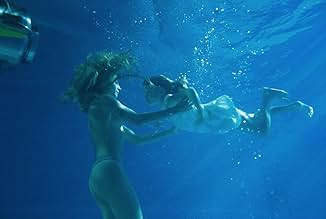Various lives converge on an isolated island, all connected by an author whose novel has become inextricably entwined with his own life.Various lives converge on an isolated island, all connected by an author whose novel has become inextricably entwined with his own life.Various lives converge on an isolated island, all connected by an author whose novel has become inextricably entwined with his own life.
- Awards
- 11 wins & 18 nominations total
María Álvarez
- Enfermera
- (as María Alvarez)
Javier Coromina
- Camarero Chiringuito
- (as Javier Corominas)
Alesandra Álvarez
- Luna 1 año
- (as Alesandra Alvarez)
José Ferreira
- Emplastro
- (uncredited)
- Director
- Writer
- All cast & crew
- Production, box office & more at IMDbPro
Featured reviews
10Core242
The earlier film by Julio Médem (Lovers of the Arctic Circle) is a prelude to the kind of cinematography that this Spanish film director/writer presents here. I have read most of the other comments, but they don't do justice to it, mainly because of the lack of understanding the original tongue of this film. The screenplay is excellent, full of metaphors and a rich use of very carefully chosen words. People who consider this film just an excuse for depicting sex scenes as the highlight of the movie are pretty much clueless. It is more than that, it is the complex storytelling that tangles the characters in this movie and the way that is told. Compelling and breath-taking. A must see.
This is one of the better structured movies ever put to screen. It's as complex as Lynch's Lost Highway, but that only adds to the experience. A non-linear structure (in time and space) is applied and Lucia y el Sexo blurs the line between reality and imagination.
Basically, it's like Mulholland Drive: Most of what we see is a dream, imagination. Only a relatively small part did really happen. But this goes one step further: What part is in the eye of the beholder here, because little clues are given so the mystery format is only used to keep us entertained at a basic level.
A writer is the center here. Some parts of his life are probably true (trouble at home, sickness), others are ambiguous, others are certainly imagined. He is in the meta-story, but also places himself in threads in the other stories that come from his imagination. His imagination is formed by applying smaller and larger events (meeting a person at a party, seeing someone in front of the house) in his personal life to his fantasies. His erotic fantasies explain the title, as sex is one of the characters of the story. One of the story lines is again about his script read on the island by one of his imagined characters. Writing the story and telling the story is done simultaneously. As he becomes sick, the characters become helpless in the story. Overall it helps a lot if you keep imagining that you're watching imagined characters being manipulated by the writer. This combines meta-story and story, real with imagination, weaving several threads in a complicated web of story lines. In the end, it is made clear that the story doesn't end but starts again halfway, giving further evidence that viewers can use their imagination at random on this and create their own story out of it.
The meta-story is interesting, but by mixing it with the story itself we see the real story as what it is, a writing trick with imagined characters. That unfortunately diminishes the emotions a movie tries to convey. We're merely watching how a movie is structured, with the imagined story not having the usual dramatic impact.
It's remarkable that so many people are offended by the sex scenes, as it's already in the title. Do they also complain about the presence of aliens in Alien? I found the sex scenes to be made with some honesty; and at least they didn't even shy away of male nudity.
Basically, it's like Mulholland Drive: Most of what we see is a dream, imagination. Only a relatively small part did really happen. But this goes one step further: What part is in the eye of the beholder here, because little clues are given so the mystery format is only used to keep us entertained at a basic level.
A writer is the center here. Some parts of his life are probably true (trouble at home, sickness), others are ambiguous, others are certainly imagined. He is in the meta-story, but also places himself in threads in the other stories that come from his imagination. His imagination is formed by applying smaller and larger events (meeting a person at a party, seeing someone in front of the house) in his personal life to his fantasies. His erotic fantasies explain the title, as sex is one of the characters of the story. One of the story lines is again about his script read on the island by one of his imagined characters. Writing the story and telling the story is done simultaneously. As he becomes sick, the characters become helpless in the story. Overall it helps a lot if you keep imagining that you're watching imagined characters being manipulated by the writer. This combines meta-story and story, real with imagination, weaving several threads in a complicated web of story lines. In the end, it is made clear that the story doesn't end but starts again halfway, giving further evidence that viewers can use their imagination at random on this and create their own story out of it.
The meta-story is interesting, but by mixing it with the story itself we see the real story as what it is, a writing trick with imagined characters. That unfortunately diminishes the emotions a movie tries to convey. We're merely watching how a movie is structured, with the imagined story not having the usual dramatic impact.
It's remarkable that so many people are offended by the sex scenes, as it's already in the title. Do they also complain about the presence of aliens in Alien? I found the sex scenes to be made with some honesty; and at least they didn't even shy away of male nudity.
This Spanish film has an unusual look and feel and dares to take chances in the way that it mixes fantasy and reality. The result is an interesting film, which is often confusing and frustrating. I'm sure that this was not entirely accidental and that the filmmakers wanted to keep the audience in a state of disorientation. Nevertheless, the convolutions of the story appear to serve no other purpose than to keep us off balance.
The films biggest sin is the scene in the middle of the film where the daughter Luna opens the bedroom door. The following event is presented in such a way that we are left guessing as to what has just happened. There's no reason for withholding it, except the misguided idea that lack of clarity is artistically valuable. I think that despite it's flaws, this film shows a great vibrancy and energy.
People talk a lot about the sex scenes. The film doesn't have much to say about sex and it certainly isn't about sex. Nevertheless, the scenes do not seem tacked on for the sake of it and, in an era when Hollywood seems to be gripped by a new puritanism, it's refreshing to see a frank depiction of what is, after all, an important aspect of the relationship between these characters.
The films biggest sin is the scene in the middle of the film where the daughter Luna opens the bedroom door. The following event is presented in such a way that we are left guessing as to what has just happened. There's no reason for withholding it, except the misguided idea that lack of clarity is artistically valuable. I think that despite it's flaws, this film shows a great vibrancy and energy.
People talk a lot about the sex scenes. The film doesn't have much to say about sex and it certainly isn't about sex. Nevertheless, the scenes do not seem tacked on for the sake of it and, in an era when Hollywood seems to be gripped by a new puritanism, it's refreshing to see a frank depiction of what is, after all, an important aspect of the relationship between these characters.
(8/10) Refreshing, delightful, sexy. moving and thought-provoking movie from Spain. Not really porn (as the title might suggest) although there is some very artistic explicitness. It is movies like this one that remind us that European cinema can scale the emotional dilemmas and mountains of a story where other films look at a storyline in terms of physical developments. Lucia, a young waitress in Madrid, falls completely in love with a writer. After a period of blissful togetherness, something from his past pulls him in two directions. We are caught up in his moral dilemma, of not wanting to lose the wonderful gift he has found and yet not wanting to be untrue to himself. The semi-autobiographical novel he is writing pulls together the story and the emotions and hopes of the characters and introduces ideas that enable them to heal some of their hurt. A central idea is that of finding a hole (symbolically on the sandy beach) where, after reaching the end of the story, you can jump back into the middle. That way you can try an make things turn out better ("If you give me time", says Lorenzo, Lucia's boyfriend.) A more mature and rounded work than the Director's earlier "Lovers of the Arctic Circle", Sex and Lucia combines wonderful acting, a great story, innovative cinema and spine-tingly beautiful photography. One of my favourite films of the year.
This movie in my view is not understandable without any notion of the 'soul', whose movements are made visible by magnificent underwater shots. The sexual scenery functions not only as entrance to the story; I think Medem really wanted to depict something like 'the ultimate sex' both as experience and as ultimate, divine ideal, something like Goethes 'eternal feminine.' As something to strive for, it can deeply affect our lives by giving it the splendour we need to keep it worthwhile, even if we fail. At the same time, it is also a power deep down, a dark shadow that haunts us. It's for us to see, to accept, and to decide: do we want to go to our island and unite the two, as Lucia does? In that case, we might see that in the end our stories come true as well, be it by breaking in in the middle.
The question I asked myself after watching the movie for the third time was: where exactly is this 'middle' of it? It seems to me that it's around the scene where Elena is walking through Madrid with Luna in her baby carriage, while passing the apartment of Lucia and Lorenzo. From then on, the decisions made by the novelist - like the shivery death of his child - are such that there is no way back. Lorenzo, Lucia and their relationship are too heavily shaken up. Both have to get into a new reality which can transform their personalities; to both, this means a form of dying and leaving their old personalities behind. They surely resist this, especially Lorenzo; but also he has to put himself at risk, following the demands of his 'blood', that is, of his sex, death and rebirth. And there the story takes over the initiative from the writer, who himself is thrown into it - in the middle, where he leaves his home and runs into his 'accident'. Exactly that scene is not shown - it's the hole in the middle, through which the old reality passes into the new.
For me, this movie is a small masterpiece, which shows how film and literature can work together, and how more powerful ideas about ourselves are then the circumstances we are put into. The 'form' of the persons is therefore changeable: like Lorenzo during the last Island episode has 'changed' into Carlos. As the 'transformed' Lorenzo turns up on the island, with his distress and his love for both Elena and Lucia, 'Carlos' is no longer necessary and the women can leave him behind. The fact that Elena is eventually able to weep, marks the acceptance of her loss, which 'naturally' returns her child to her from the middle of the picture again.
The question I asked myself after watching the movie for the third time was: where exactly is this 'middle' of it? It seems to me that it's around the scene where Elena is walking through Madrid with Luna in her baby carriage, while passing the apartment of Lucia and Lorenzo. From then on, the decisions made by the novelist - like the shivery death of his child - are such that there is no way back. Lorenzo, Lucia and their relationship are too heavily shaken up. Both have to get into a new reality which can transform their personalities; to both, this means a form of dying and leaving their old personalities behind. They surely resist this, especially Lorenzo; but also he has to put himself at risk, following the demands of his 'blood', that is, of his sex, death and rebirth. And there the story takes over the initiative from the writer, who himself is thrown into it - in the middle, where he leaves his home and runs into his 'accident'. Exactly that scene is not shown - it's the hole in the middle, through which the old reality passes into the new.
For me, this movie is a small masterpiece, which shows how film and literature can work together, and how more powerful ideas about ourselves are then the circumstances we are put into. The 'form' of the persons is therefore changeable: like Lorenzo during the last Island episode has 'changed' into Carlos. As the 'transformed' Lorenzo turns up on the island, with his distress and his love for both Elena and Lucia, 'Carlos' is no longer necessary and the women can leave him behind. The fact that Elena is eventually able to weep, marks the acceptance of her loss, which 'naturally' returns her child to her from the middle of the picture again.
Did you know
- TriviaSome of the most sexual explicit content was made by doubles, not by the main actors.
- GoofsA full moon between two buildings is shown during midday when Lorenzo meets his daughter Luna for the first time - which is astronomically impossible.
- Crazy creditsCredits scroll in the opposite direction.
- Alternate versionsThe US cut removes most of the frontal nudity and runs approximately 2 minutes shorter.
- ConnectionsFeatured in Brows Held High: Room in Rome (2013)
- SoundtracksUn Rayo de Sol
Written by Daniel Vangarde (as Vangarde), Claude Carrère and Amado Jaén (as Jaen)
(c) Bleu Blanc Rouge Editions Soc - Editions Productions Zagora
Ediciones Musicales Clipper's, S.L.
Details
Box office
- Gross US & Canada
- $1,594,779
- Opening weekend US & Canada
- $47,591
- Jul 14, 2002
- Gross worldwide
- $7,640,680
- Runtime
- 2h 8m(128 min)
- Color
- Sound mix
- Aspect ratio
- 2.35 : 1
Contribute to this page
Suggest an edit or add missing content
















